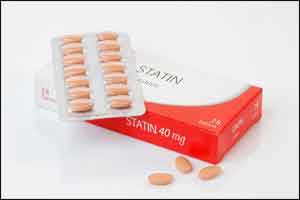- Home
- Editorial
- News
- Practice Guidelines
- Anesthesiology Guidelines
- Cancer Guidelines
- Cardiac Sciences Guidelines
- Critical Care Guidelines
- Dentistry Guidelines
- Dermatology Guidelines
- Diabetes and Endo Guidelines
- Diagnostics Guidelines
- ENT Guidelines
- Featured Practice Guidelines
- Gastroenterology Guidelines
- Geriatrics Guidelines
- Medicine Guidelines
- Nephrology Guidelines
- Neurosciences Guidelines
- Obs and Gynae Guidelines
- Ophthalmology Guidelines
- Orthopaedics Guidelines
- Paediatrics Guidelines
- Psychiatry Guidelines
- Pulmonology Guidelines
- Radiology Guidelines
- Surgery Guidelines
- Urology Guidelines
Statins May Help in Primary Sclerosing Cholangitis

A large register-based study conducted in Sweden has found that statins are associated with a markedly reduced risk of all-cause mortality, liver transplantation, liver cancer, and variceal bleeding in patients with primary sclerosing cholangitis (PSC). The study, which reviewed the records of almost 3,000 patients diagnosed with PSC between 2005 and 2016, also reported a reduced risk of these outcomes in patients receiving azathioprine, but not in those receiving ursodeoxycholic acid (UDCA).
The award-winning study, presented today at The International Liver Congress 2018 in Paris, France, was conducted to assess the impact of exposure to different drugs, including statins, UDCA, aminosalicylates, antibiotics, azathioprine, and corticosteroids, on various clinical outcomes in patients with PSC. A total of 2,914 patients were identified from different registers and included in the analysis. All patients had Crohn's disease or ulcerative colitis (or both); the total follow-up time was 11,769 patient years. Of the patients included in the analysis, 74.4% had been exposed to 5-aminosalicylic acid, 60.2% to UDCA, 33.7% to azathioprine/mercaptopurine, 91% to antibiotics, 12.1% to antimycotics, 34.2% to metronidazole, 69.3% to corticosteroids, and 13.9% to statins. Exposure was defined as the time from the first dispensing of the drug after 2005 to the end of the study period.
'Both azathioprine and statins were associated with a decreased risk of death, liver transplantation and variceal bleeding in our study', said Dr. Knut Stokkeland from Visby Hospital and the Karolinska Institute in Sweden, who presented the results today. 'Statins were associated with a decreased risk of all-cause mortality by 32% and a decreased risk of death or liver transplantation by 50%'.
'This is the first study of statins in PSC—a condition for which, today, there are no other medical therapies', noted Dr. Stokkeland. 'We think that statins may be promising candidates for the treatment of PSC; however, there is currently insufficient evidence to justify recommending routine use of these agents in PSC. Further evaluation, preferably in a randomized controlled setting, needs to be undertaken'.
'Primary sclerosing cholangitis is a disease that still has no ideal treatment options', said Prof. Marco Marzioni from the University Hospital of Ancona, Italy, and EASL Governing Board Member. 'Although registries are not equivalent to clinical trials and thus cannot lead to any solid therapeutic recommendations, they are of great value in understanding the general features of diseases, particularly in rarer diseases such as PSC. This study offers the possibility to study the potential effectiveness of statins in PSC, and may be helpful in informing future clinical trials to unveil novel therapeutic pathways'.

Disclaimer: This site is primarily intended for healthcare professionals. Any content/information on this website does not replace the advice of medical and/or health professionals and should not be construed as medical/diagnostic advice/endorsement or prescription. Use of this site is subject to our terms of use, privacy policy, advertisement policy. © 2020 Minerva Medical Treatment Pvt Ltd